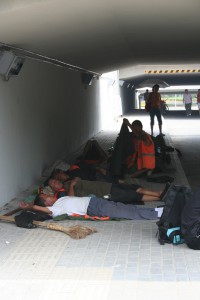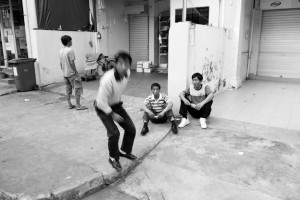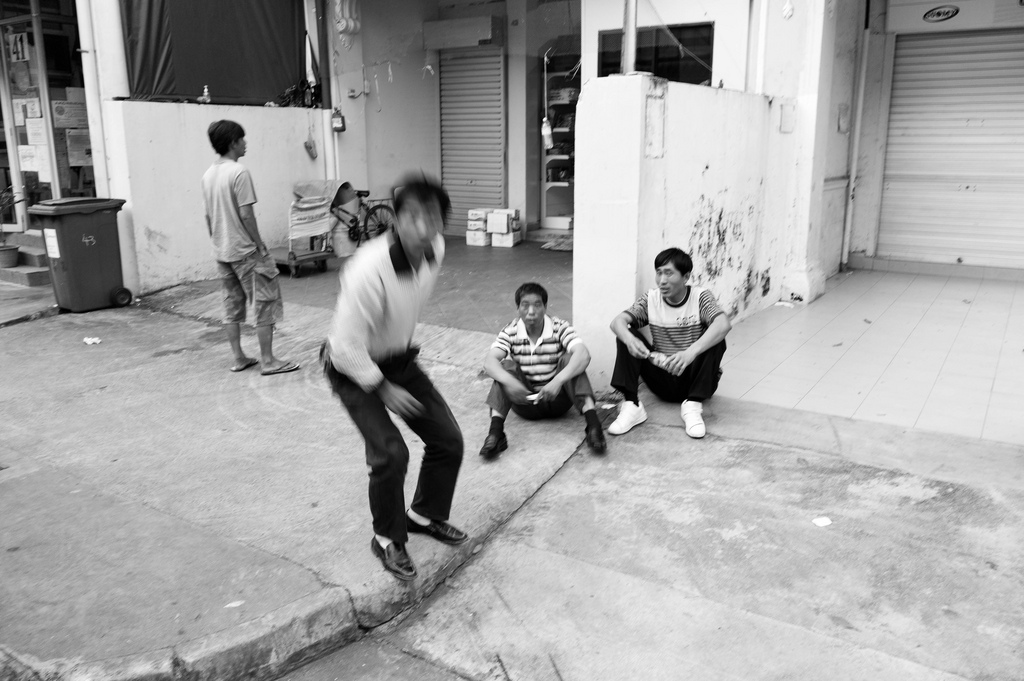It’s a Sunday afternoon, you are on the local Hong Kong subway, the MTR, heading south from the university to do some shopping. The minute the MTR draws into Admiralty station, you remember that you’ve made a huge mistake; there are masses of people cramming in and out of the car and you once again get cornered into the far end or the car and almost miss your stop. It is Sunday, the one day-off in a week that the domestic workers have in Hong Kong, when the streets and parks are filled with Indonesian and Filipino workers, mostly women. They are on Skype on their smartphones, using the always-accessible Hong Kong internet, reaching family members and relatives in distant countries. What goes on in the minds of these women, who need to sustain their families’ lives abroad by working for a minimum wage of €2,60 per hour, in this metropolitan city?
 The rights of Hong Kong’s approximate 300, 000 maids, and other domestic workers, have been in international media in the last few years when the residency legislation was altered. The new legislation was adopted in order to tackle so-called ‘job-hoppers’ -migrants changing jobs on a regular basis. This change gravely impacts domestic workers: the Immigration Department has set stricter measures to ‘premature contract termination’, meaning that the worker might have to stay under the employer’s roof under any circumstance. The standard 2-year contracts between the worker and the employer can only be terminated on grounds of “ – transfer, migration, death or financial reasons of the ex-employer, or if there is evidence suggesting that the foreign domestic helper (FDH) has been abused or exploited”, the Hong Kong immigration department reports. In addition, the Department can deny the worker new employment if they have had multiple contracts before. There is no way back into Hong Kong for a terminated worker and therefore legal steps need to be taken with care.
The rights of Hong Kong’s approximate 300, 000 maids, and other domestic workers, have been in international media in the last few years when the residency legislation was altered. The new legislation was adopted in order to tackle so-called ‘job-hoppers’ -migrants changing jobs on a regular basis. This change gravely impacts domestic workers: the Immigration Department has set stricter measures to ‘premature contract termination’, meaning that the worker might have to stay under the employer’s roof under any circumstance. The standard 2-year contracts between the worker and the employer can only be terminated on grounds of “ – transfer, migration, death or financial reasons of the ex-employer, or if there is evidence suggesting that the foreign domestic helper (FDH) has been abused or exploited”, the Hong Kong immigration department reports. In addition, the Department can deny the worker new employment if they have had multiple contracts before. There is no way back into Hong Kong for a terminated worker and therefore legal steps need to be taken with care.
In late April, the BBC reported the story of a 26-year-old Indonesian Rohyati working in Hong Kong who was misused by her employer. Instead of getting help from her work agency, through which she found her job and was provided assistance and protection, she was inspired by another maid whose case had gained wide media attention, and Rohyati filed a police report. Amnesty International has criticised Hong Kong’s work agencies for not looking after their employees. Rohyati first reported to her agency who only told her to be patient with her employer as not much could be done before she had paid her fees to the agency and would be able to leave.
Rohyati was not the first, nor will she be the last, worker who experiences maltreatment at the hands of her employers. Thousands of domestic workers in Hong Kong fall under the category of bonded labourer which is defined as a form of slavery by Anti-Slavery International. Victims of bonded labour work under lacking working conditions, with a salary that is incompatible with other forms of income, in an abusive environment. Slavery and abuse are two of mankind’s oldest crimes and has endured through the contemporary world. The International Labour Organisation (ILO) reports that there are estimated 20.9 million victims of modern slavery, who are abducted and tricked to work on all continents. Tragically enough, this number of 20.9 million cannot even be outdone by the Trans-Atlantic Slave Trade in the amount of shipped slaves throughout those 300 years of business.
 Bonded labour is most common in Southeast Asia but Europe has a lot to work on as well. In the shade of the Big Ben in London, a decision was made in 2012 that domestic workers entering the UK cannot legally leave their employer, making the country one of the most abusive destinations in Europe. Migrants have no option to report their abuse from behind closed doors and if they escape, they become illegal immigrants. Most of the domestic workers find employment through family members and receive very little payment. They come from unstable, conflict ridden countries to which they have no way of returning if they illegally escape their employer. “Confiscation of passports, confinement to the home, physical and emotional abuse, long working hours with no rest time, no holidays, and low wages or non-payment of wages”, Human Rights Watch found many factors opposing human rights that are daily for the migrant workers in the UK, and reported them on March 31st. In both cases the UK and Hong Kong, the states have themselves contributed to the worsening of circumstances that foreign domestic workers arrive to.
Bonded labour is most common in Southeast Asia but Europe has a lot to work on as well. In the shade of the Big Ben in London, a decision was made in 2012 that domestic workers entering the UK cannot legally leave their employer, making the country one of the most abusive destinations in Europe. Migrants have no option to report their abuse from behind closed doors and if they escape, they become illegal immigrants. Most of the domestic workers find employment through family members and receive very little payment. They come from unstable, conflict ridden countries to which they have no way of returning if they illegally escape their employer. “Confiscation of passports, confinement to the home, physical and emotional abuse, long working hours with no rest time, no holidays, and low wages or non-payment of wages”, Human Rights Watch found many factors opposing human rights that are daily for the migrant workers in the UK, and reported them on March 31st. In both cases the UK and Hong Kong, the states have themselves contributed to the worsening of circumstances that foreign domestic workers arrive to.
In June 2011, the UK was one of the nine countries that did not vote in favour of the International Labour Organization (ILO) Domestic Workers Convention, which Hong Kong ratified. The UK requires written terms and labour contracts made between the worker and the employer but there is no mechanism to control them, whereas in Hong Kong the abusive employers have been kept somewhat under control, imprisoning abusive employers on a yearly basis. The established work agencies in Hong Kong provide contracts and help for the domestic workers in the country, whereas in London no external middle-hand to oversee the rights of the individual domestic worker when the contract is between two individuals.
The UK has recently tightened its penalty legislation on domestic abuse, if found guilty the sentence now lies between 14 years to life. Even if the penalties for modern slavery would be increased, it would not help the plight that the victims have endured. Who works for the improvement of domestic workers’ rights? Most of the victims are uneducated young women who have no way of affecting their life in their home- nor receiving country. When it comes to Asia, or contemporary Europe, or any other corner of our planet, one of the world’s oldest crimes continues on our watch. We need to bring the disease of slavery back to the surface, thus preventing it from spreading further in our interconnected world.
By Charlotta Lahnalahti
Image credit:
Picture 1: Kaj17, licensed under CC BY-NC-ND 2.0
Picture 2: Kevin Utting, licensed under CC BY 2.0







